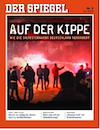“New Year's Eve may have marked a dramatic turning point”, writes Der Spiegel. Sexual assaults were perpetrated en masse in several cities, as if coordinated by some invisible hand. Two of the alleged attacks in Cologne ended in rape.
What happened in Cologne – and to a lesser extent in Hamburg – on New Year's Eve and in the following days “adhered to a script that many had feared would come true even before it actually did. The fears of both immigration supporters and virulent xenophobes came true”, writes the magazine —
For some, the events finally bring to light what they have always been saying: that too many foreigners in the country bring too many problems along with them. For the others, that which happened is what they have been afraid of from the very beginning: that ugly images of ugly behavior by migrants would endanger what has been a generally positive mood in Germany with respect to the refugees.
Receive the best of the independent European journalism straight to your inbox every Thursday
What is certain, adds Der Spiegel, is that “difficult days are ahead”, and they bring at least two questions:
Is Germany really sure that it can handle the influx of refugees? And: Does Germany really have the courage and the desire to become the country in Europe with the greatest number of immigrants? […] It seems as though the time has come for a broad debate over Germany's future -- and Merkel's mantra "We can do it," is no longer enough to suppress it. […] Integration, integration policy, repression, immigration policy, caps on immigration: The events in Cologne have profoundly changed the dynamics of Berlin politics. Chancellor Merkel and her confidants fear that it will only get more difficult to enforce their current refugee policy.
The Chancellor has already shifted her position, at least when it comes to discourse. Talking surprisingly soon after the violence in Cologne, she said that it deserved a “tough response by the government" and dismissed as “nonsense” popular claims that she “likes the fact that many refugees are coming to Germany”.
But Angela Merkel cannot deviate too much from her initial political path either:
were Germany to begin turning people back at its borders, the Schengen system of border-free travel in Europe would collapse.
While it took the media some days to grasp the full extent of the violence in Cologne and Hamburg and of the lack of response from the police and political establishment, Der Spiegel believes the first thing to be done is to be completely honest about the facts and the situation:
Germans are not children who need to be protected from the truth for well-intended reasons. And part of the truth is the fact that politicians like to talk about integration but have not yet given any indication that they understand the magnitude of the challenge facing them. Another part of the truth is this: German society is becoming increasingly divided.
Do you like our work?
Help multilingual European journalism to thrive, without ads or paywalls. Your one-off or regular support will keep our newsroom independent. Thank you!













